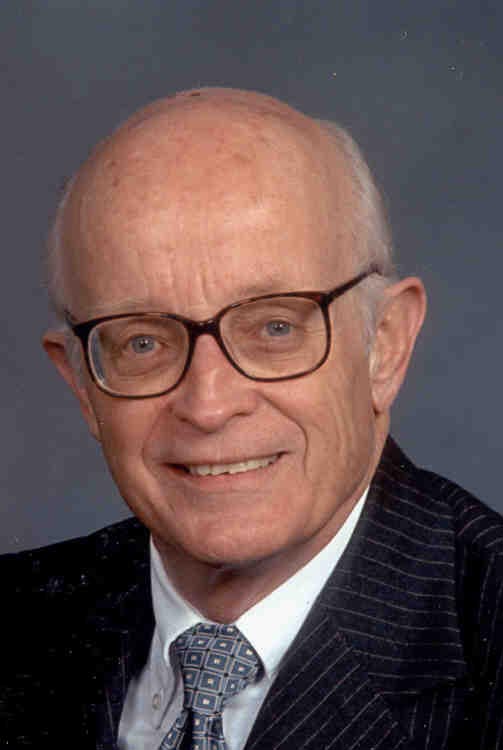
DALLAS (BP)–While the Discovery Institute’s involvement in the Texas biology textbook case drew considerable media attention, another key player is a deacon at First Baptist Church of Dallas.
Ide Trotter is the spokesman for Texans for Better Science Education, an informal citizens network that banded together to press for changes in the state’s high school biology textbooks.
One of dozens of residents who testified at a 12-hour hearing in September, the Southern Baptist layman is a former university professor with a Ph.D. in chemical engineering from Princeton University.
His career started in the research division of Exxon. He also served as the dean of business at Dallas Baptist University from 1986-90. Today, he runs his own investment management company.
Trotter noted there are atheists, Jews and others who also challenge evolutionary presentations high school biology textbooks.
Texans for Better Science Education’s primary issue is correcting scientific errors, not advocating for religious beliefs, Trotter said.
“We are only talking about the science,” the spokesman said. “We don’t want intelligent design or creationism taught. We only want error-free science taught.
“You can find credible literature at important turning points in science that support different paths to a resolution of issues. What we are upset about is the textbooks continue to present material that has been discredited and do not fit current ideas about evolution.”
More than 30 supporters of Texans for Better Science Education attended the September hearing where Trotter testified.
One reason the selection process drew such attention is that only California buys more textbooks than Texas, and elsewhere decisions often are decentralized. Changes made in Texas texts often affect many other states, Trotter said.
Although evolution still holds center stage in biology, Trotter pointed out that evolutionary theory is no longer Darwin’s theory. Darwin’s ideas were updated at the end of World War II, he said, and replaced by a neo-Darwinian synthesis.
While the idea is still graduated change over time, it has become clear evolution doesn’t always proceed in that manner, Trotter said.
Thus, he said the late Stephen Jay Gould, an influential Harvard scientist, came up in the early 1970s with the idea of “punctuated equilibrium” to explain how sometimes changes occur rapidly.
Given these developments, Trotter said textbooks need to present a more balanced view of evolution’s strengths and weaknesses, as required by Texas law.
Trotter noted that after the Nov. 7 vote adopting the biology books, Texas’ education commissioner, Robert Scott, promised that remaining factual errors will have to be addressed before students start using them.
“It may or may not happen; I hope it will,” Trotter said. “But the thing I would like for everyone to understand — if no other changes are made — on balance the textbooks are substantially better than when they were first brought before the board of education.
“A significant number of changes have been made. Rome wasn’t built in a day. Things are moving in the right direction and there’s going to be another round down the road.”
Since Albert Einstein discovered the theory of relativity in 1915, all major discoveries have made the underlying concepts behind evolution tougher to defend, Trotter said. For example, he said:
— The time frame conceived for evolutionary processes used to be considered as infinite but has since been reduced to a few million years. That has required evolutionists to acknowledge the need for fast-moving mechanisms of change.
— Darwin conceived of the cell as a blob of protoplasm. But since then, scientific discoveries have shown that the cell is an extraordinarily complex piece of machinery with its own energy conversion, transportation and security systems.
“The notion that it would just sort of spontaneously arise in the little bit of time that is obviously all that is available to [evolution] — that is a very, very tough sell,” Trotter said. “So people are going to dig into this further. It’s going to become more apparent that’s a problem and it’s going to have to be faced.”
Even groups like the National Center for Science Education have conceded that evolution doesn’t have an agreed-on path by which it occurred, he added.
Thus, they can’t agree on the process by which micro-evolution — which everyone agrees occurs — might have proceeded to a macro-evolution stage, Trotter said.
Evolutionists try to keep high school students from learning about such controversies, saying it would just confuse them, Trotter said.
It is worthwhile to note the difference in approach between biologists and those who teach chemistry or physics, Trotter said. He said the latter find what they don’t know exciting, since they recognize unknown areas as new frontiers to be explored.
“The ball is rolling and it’s going downhill,” Trotter said. “There are not enough forces on the side of Darwinism to keep pushing it back uphill forever.”
–30–
(BP) photo posted in the BP Photo Library at https://www.bpnews.net. Photo title: IDE TROTTER.














